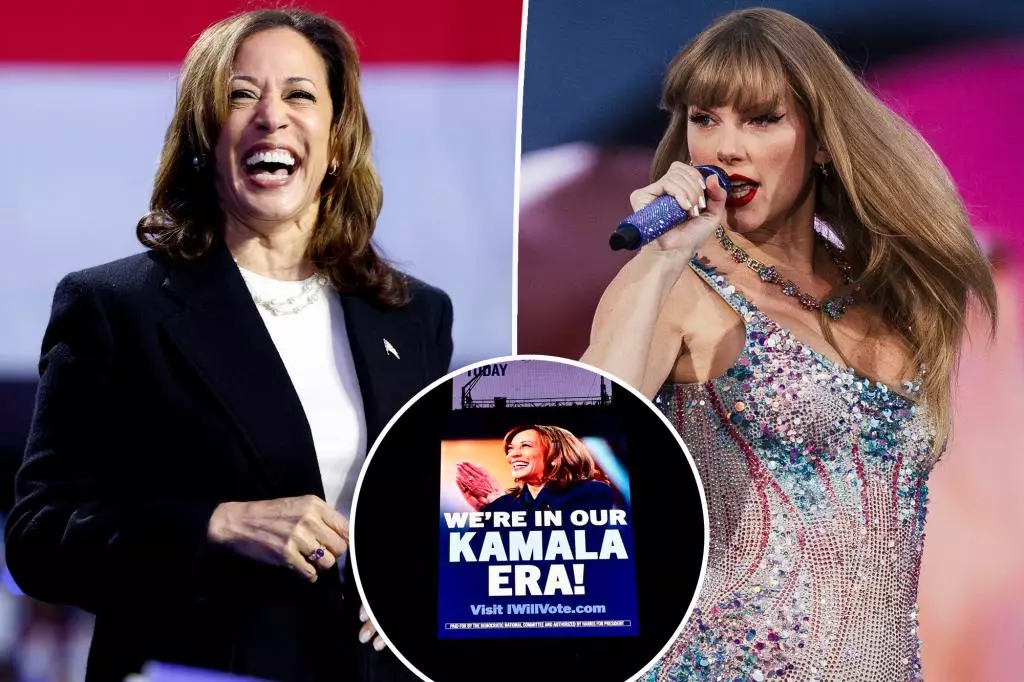In the modern political landscape, it is no longer rare to see the fusion of celebrity culture with electoral campaigns. This phenomenon was illustrated recently through Taylor Swift’s endorsement of Vice President Kamala Harris for the 2024 presidential election. Swift’s influence as a global pop icon has become a catalyst for political mobilization, showcasing how celebrity endorsements can drive voter engagement and impact the dynamics of campaigning.
Swift’s decision to support Harris comes after a period of silence regarding her political stance during the recent presidential debate. The pop star took to her Instagram, marking her choice by stating, “I will be casting my vote for Kamala Harris and Tim Walz in the 2024 Presidential Election.” By strategically aligning herself with a political figure known for advocating progressive values, Swift not only amplifies Harris’ campaign message but also reinforces her own commitment to social justice causes. Her assertion that Harris is a “steady-handed, gifted leader” taps into a broader narrative of seeking calmness over chaos in leadership, which resonates with many voters disillusioned by political instability.
Swift’s endorsement has transcended mere celebrity endorsement; it serves as a rallying cry for her fandom, the Swifties, who are not only ardent supporters of her music but increasingly engaged in social and political issues. Her endorsement is more than symbolic; it resulted in a dramatic spike in voter registrations, with over 400,000 individuals signing up to vote in less than 24 hours. This phenomenon underscores the power of celebrity in influencing political participation among younger demographics, who may feel otherwise disconnected from traditional political messages.
Following Swift’s show of support, the Harris-Waltz campaign capitalized on this momentum by releasing friendship bracelets, a trend popularized by Swift’s fans. This clever marketing move bridges the gap between pop culture and political activism, appealing to a younger audience that appreciates such creative intersections. By aligning their merchandise with Swift’s imagery and ethos, the campaign not only honors the endorsement but also invokes a sense of community among supporters.
The Democratic National Committee’s promotional efforts in Times Square, including billboards featuring messages like “We’re in our Kamala era” and play off Swift’s song lyrics, exemplify how campaigns are adapting their strategies to engage with contemporary cultural references. This shift represents a significant move toward modernized campaigning, where engaging visual elements and references resonate more deeply with an increasingly visual-driven society.
Conversely, the Republican camp, led by Donald Trump, has attempted to counteract the enthusiasm surrounding Swift’s endorsement by releasing merchandise that mirrors her own. Trump’s attempt to leverage Swift’s popularity by creating “knock-off” Eras Tour T-shirts indicates an acknowledgment of her influence, albeit laced with a competitive tone. His dismissal of Swift’s endorsement of Harris during an interview, where he suggested a preference for another celebrity’s support, illustrates the complicated dynamics at play when celebrity endorsements impact traditional political narratives.
This interaction highlights a broader issue: while celebrities like Swift can galvanize support for a candidate, they can also provoke defensiveness and response from opposing parties. Polarization in response to celebrity endorsements could lead to heightened partisan divides, influencing not just voter turnout but also the general atmosphere surrounding electoral campaigns.
The endorsement of Kamala Harris by Taylor Swift underscores the complex interplay between celebrity influence and politics in the current era. Swift’s ability to mobilize young voters, coupled with the strategic responses from political campaigns, demonstrates a significant evolution in how political narratives are shaped. As we advance into the 2024 election cycle, the stakes of celebrity endorsements will likely continue to grow, raising questions about the efficacy and authenticity of such alliances in shaping public opinion and driving voter engagement. This interplay not only reflects the current state of American politics but also hints at the future of campaigning in an increasingly interconnected cultural landscape.


Leave a Reply